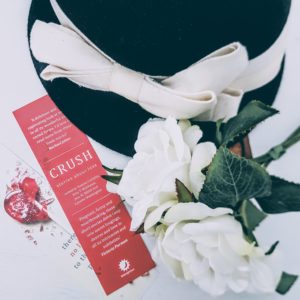We’ve reached the end of our series of Q&As with the authors of Crush! In our final installment, get to know Katherine Arguile and read an excerpt of her story ‘Utaki’.

Can you give us a bit of background about yourself? How did you come to writing?
I’m half-Japanese, half-English, born and raised in Tokyo. I’m Australian now too, after moving here from London nine years ago. I recently finished a novel called The Things She Owned as part of a PhD, a major milestone marking a lifetime of writing stories. I loved books as soon as I could read them, and they made me want to write. So I started writing while I was still very young.
How do you get your ideas? Is there anywhere particular you look for inspiration?
I draw heavily from my own life experiences. Japan often features in my work — unsurprisingly, since my mother was Japanese and I spent my childhood there — and Okinawa in particular. Okinawa, while a prefecture of Japan, used to be its own kingdom with its own culture. It’s had a substantial American military presence there since the Second World War. There’s something about the liminality of the place that appeals to me, because culturally I see myself as in-between. I spent some time in Okinawa researching for my first novel and was seduced by its wildness and beauty.
I also write a fair bit about death, grief and how objects can carry the weight of loss — subjects which I examined in depth for my PhD.
I carry a notebook with me and jot down any ideas that come to me.
What does your writing process look like? Does it change from story to story?
I wish I could say I had a consistently systematic approach! The best analogy I can think of for my writing process is working with pottery. The scooping up of the clay from the bucket is the gathering of ideas through research, note-taking, mulling over and daydreaming. When I slap the clay on the potter’s wheel in an amorphous lump, that’s me putting down a quick and rough draft of the story. I’ll then spend lots of time shaping and smoothing — that’ll be the process of editing my way through several drafts. The glazing and firing is the final edit and polish. This is the process I use for pretty much every story I write.
How do you approach building the structure of a story? Do you like to play with form?
I tend to work intuitively with structure at first, putting down what feels right in the earliest drafts. I’ll re-read my work again and again, checking it for cohesiveness and flow. I’ll add a bit of clay if it needs it, or scrape some away. I enjoy playing with form and rhythm— I’m so grateful for the screen and keyboard that allow me to cut and paste and move sections around; to try out different tenses, pacing or points of view to see what works best. And then I might change my mind completely and turn a bowl into a vase, so to speak — recently I wrote one story which I realised could be turned into two: a piece of flash fiction and a longer short story. That was unexpected and satisfying.

Crush explores a variety of interpretations and experiences of romantic love. What aspects of love did you want to explore in your writing?
In ‘Utaki’, I wanted to explore how suffocating restrictive notions of love must have been for women in previous centuries. It seems love was so tied up with duty in a traditional marriage back then; the wife promising in her wedding vows to obey her husband, while the husband promised no such thing. It would have been considered unseemly for a woman to give in to her passions. Women weren’t encouraged to live independent lives and this must have heightened the sense of being trapped for those in unhappy marriages. I wondered what it would have been like for someone in previous centuries whose own yearning for love didn’t fit these traditional notions. It must have been very hard indeed.
How have you tried to either embrace or push the boundaries of the romance genre in your writing?
Being fluid-boundaried myself, I struggle to frame my writing in terms of genre. If I had to name one, it would be literary fiction. I explore ideas of love, but I wouldn’t say that the stories in which I do so can be described as belonging to the romance genre, though I’m delighted if they can be seen to fit into the category. And it doesn’t mean I wouldn’t be interested in exploring the genre in future.
Excerpt from ‘Utaki’ by Katherine Arguile
It was several weeks ago that she first came upon the women. They wore white robes folded across the chest and secured at the waist, like a kimono. Some wore their thick black hair long and loose, others in a topknot; all had long white bands of cloth wrapped about their foreheads and tied at the back of the head, with the loose ends falling down their backs. They wore glossy green crowns of leaves and their feet were bare. She heard them before she saw them; their voices a soothing rhythmic murmur, hypnotic and strange. She walked the narrow, winding path beneath its tunnel of foliage, so entranced by the dappled light and the sound of the voices that when she came upon them, pacing in a circle, eyes closed, swaying from side to side, she flushed cold with shock.
Elizabeth made no sound, but as soon as she stepped into the clearing, they froze mid-motion and stared. Silence.
Improbably long moments stretched out. The women’s gazes penetrated her. Elizabeth felt like a lone swordswoman surrounded by a multitude of swordswomen. Not knowing where to look, her gaze passed from face to face, defensive; they, with sharp eyes trained upon her, their singular object: her tight-waisted corset, her crinolines, her high collar, her buttoned boot-tips peeking out from beneath her petticoats, her sweating, alien body beneath. She did not know whether to walk on, or turn and run, and in that moment, her eyes caught those of a woman near her. Unflinching in their scrutiny, the woman’s eyes were dark, bottomless pools into which Elizabeth felt herself fall. Something powerful passed between them. A wild hare leaped within her belly, clamouring to be released. Elizabeth did not know what to do with this feeling. She turned on her heels and ran for home.
To read more of ‘Utaki’ by Katherine Arguile, pick up a copy of Crush from our online shop or from all good bookstores.
